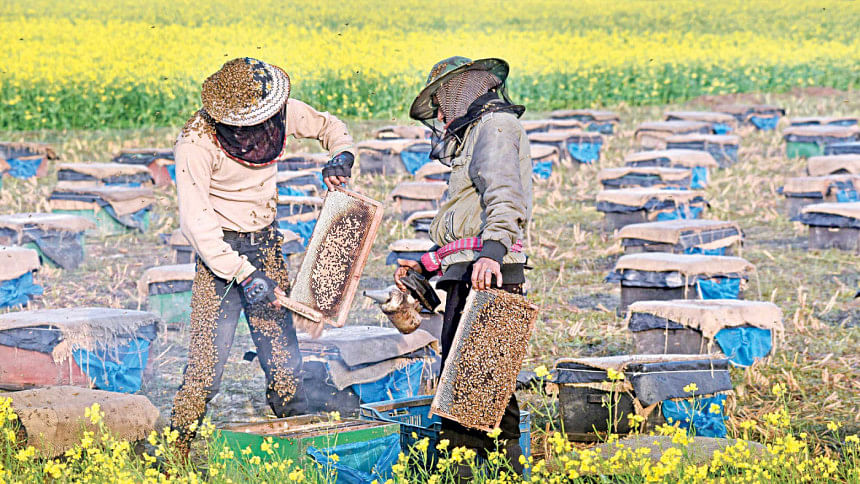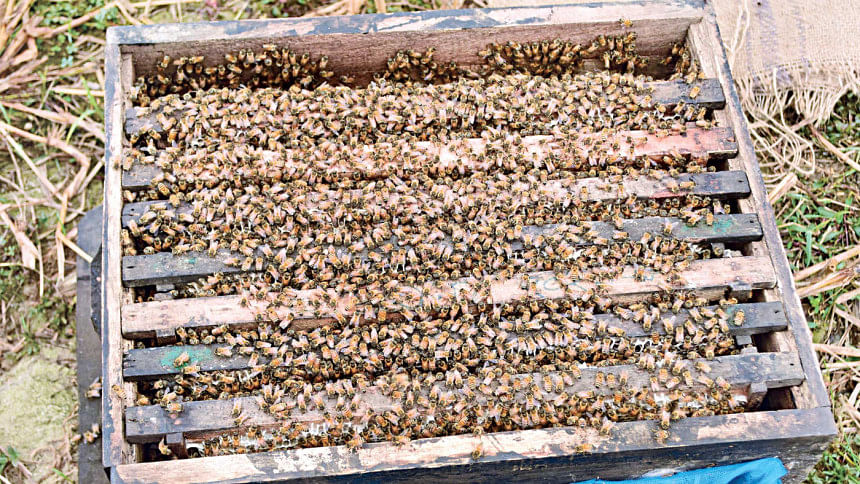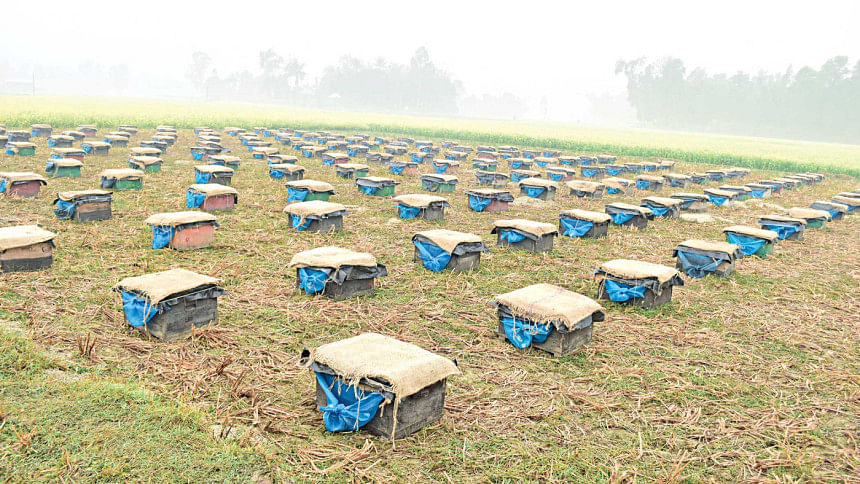Beekeepers welcome a sweet yield

The commercial beekeepers are now hard at work to collect honey from flowers at mustard fields of different regions in Tangail district.
They couldn't collect honey from mustard flowers in the last couple of years because of unfavourable weather conditions, including dense fog, rains and reduced cultivation. But a smile beamed across their faces this year, as they expect a good yield of honey, since the weather has been agreeable so far as per their prediction.
Tangail is known to be one of the biggest mustard producing regions in the country, producing nearly 50,000 tonnes every year. The crop is cultivated on 24,445-45,660 hectares for the local variety and 21,215 hectares for hybrid ones, across 12 upazilas in the district, according to officials.

Although, at the beginning of the season, mustard farming faced a cut worm infestation; it didn't cause a dent to the cultivation, as farmers took upon necessary measures, they added.
Beekeepers from different districts come to Tangail every year and set up their bee colonies (boxes) beside the local mustard fields. According to sources from the beekeeper community and the agriculture ministry, nearly 10,000 bee colonies were set up this year.
Beekeeper Nur Alam of Satkhira and his men set up 170 colonies beside a mustard field at Bartha village in Kalihati upazila. "I have received around 400kg of honey on average every week," he said.
Sazzad Hossain Talukder, upazila agriculture officer in Kalihati, said honey bees help pollination of crops and increase yields.
"Previously, mustard cultivators were afraid to allow setting up bee colonies near their crop fields, fearing reduction in the crop yield. But they changed their mind after agriculture officials assured them that they would get 15 to 20 percent increase in yield if such colonies were set up there," he said.
Munna Ahmed, a beekeper from Tangail's Gopalpur, and Ashraf Ali from Dhanbari upazila, have set up 180 and 250 colonies beside mustard fields at Langulia and Berbari areas in Sakhipur upazila.
"I am getting about five maunds of honey every week and the production is more satisfactory this year than the last," Munna said.
Ashraf Ali said he is getting about seven maunds of honey every week.

Mustard was cultivated in around 6,000 hectares of land at Basail and Sakhipur upazilas in Tangail this year.
"Around 1,100 bee colonies were set up at Basail and around 900 in Sakhipur," said Niyonta Bormon, upazila agriculture officer in Sakhipur, adding that the collection target was set at 12 tonnes of honey minimum, from the two upazilas.
Beekeepers said they get honey five times in a year.
"There are around 2,500 honey cultivators, including 500 to 600 commercial ones, in the country," said Dulal Hossain, a commercial beekeeper from Tangail's Bhuanpur upazila and former central unit president of Mou Chashi Kalyan Samity.
"In the district, there are about 150 honey cultivators, including 76 commercial ones," he said.
Honey cultivators produce around 3,000 tonnes of honey, with the highest amount -- 1,000 tonnes -- coming from mustard and about the same amount from litchi, while the rest from other crops, Dulal said.
"The number of the beekeepers in the country, however, is declining due to different problems, including unavailability of quality bees. Moreover, beekeepers cannot get fair prices for their produce due to lack of necessary modern marketing facilities," he added.

 For all latest news, follow The Daily Star's Google News channel.
For all latest news, follow The Daily Star's Google News channel. 



Comments